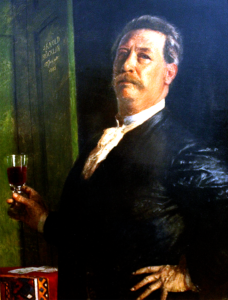Who Drinks More, the Rich or the Poor?
Audio version: To listen in a player, use the one below or click here. To download the mp3, right-click here and choose “save link as” or “save target as.”
Statistics have shown, again and again, that whites have higher per-capita levels of alcohol consumption than any other race — even the notoriously drunken Injuns.
A persistent stereotype claims that drinking is a vice indulged in by the despicable lower classes far more than the unassailably righteous upper crust. Compared to their social betters, impoverished whites are a hopeless lot of bums, winos, and Skid Row Joes.
But is that true?
Rich-kid Communist pioneer Friedrich Engels’s 1844 essay “Work Is the Curse of the Drinking Classes” noted how the “bourgeois” — as if he and most Communist thinkers who followed in his path weren’t solidly bourgeois themselves — looked down with palpable disgust at how the proles were hopeless lushes:
Drunkenness, sexual irregularities, brutality, and disregard for the rights of property are the chief points with which the bourgeois charges the workers. That they drink heavily is to be expected. . . . On Saturday evenings, especially when wages are paid and work stops somewhat earlier than usual, when the whole working class pours from its own poor quarters into the main thoroughfares, intemperance may be seen in all its brutality. I have rarely come out of Manchester on such an evening without meeting numbers of people staggering and seeing others lying in the gutter.
The title of Engels’ essay may have been an accidental reverse mangling of a common English expression during the 1800s — “drink is the curse of the working class” — that expressed pervasive upper-echelon disgust at how the sweaty, smelly, and clearly inferior British working class frittered away their chances of advancing in life by pickling themselves with booze.
Oscar Wilde, who wasn’t even alive when Engels wrote his essay, was likewise credited with inverting the popular expression — but Wilde charged the aristocracy with the sin of projection:
“Work is the curse of the drinking classes” is a quote famously uttered by Irish playwright and novelist Oscar Wilde. It is a humorous twist on the old saying “drink is the curse of the working class,” which was typically uttered by the upper classes to explain why the poor failed to climb up the socio-economic ladder. This quote captures a common sentiment that British aristocrats held about the working class, which was that they failed to improve their lot because they indulged too much. Ironically, Wilde believed that the rich were the ones doing the indulging and that their looking down their noses at the lower classes was awfully self-righteous. As Wilde saw it, work was a nuisance that seemed to be getting in the way of aristocrats’ regular drinking habit.
Was the foppish Irish playwright correct? Were the British snobs projecting their own drunkenness on the British slobs?
Unless things have flip-flopped since the 1800s, Wilde was right on the button, right on the nose. Every study I’ve seen shows that alcohol consumption is more prevalent among the well-to-do than it is among the down-and-out.
“Drinking Highest Among Educated, Upper-Income Americans,” reads the 2015 headline from Gallup:
Upper-income and highly educated Americans are more likely than other Americans to say they drink alcohol. Whereas eight in 10 adults in these socio-economic status groups say they drink, only about half of lower-income Americans and those with a high school diploma or less say they drink. . . .
Gallup has consistently found large differences in alcohol consumption among education and income subgroups over time. The income and education differences in drinking are typically larger than those seen by gender, age, race, region and religion. . . .
Data from various government and academic studies confirm the relationship between income and alcohol consumption. . . . Most Americans say they drink alcohol on occasion, but drinking is far more common among upper-income Americans and those with a more formal education. Not only are higher socio-economic status Americans more likely to drink alcohol, but those who drink do so more often than lower socio-economic status Americans.

You can buy Jim Goad’s ANSWER Me! here.
The Gallup poll found that 78% of Americans who made $75K or more a year said they drank, whereas among those who made less than $30K per annum — you know, the drunken and slovenly working classes — only 45% said they drank.
“Who in Europe drinks the most? The rich,” says a 2017 Science Daily article based on a meta-study by the Norwegian University of Science and Technology:
Terje Andreas Eikemo, a professor of sociology . . . says that the European Social Survey confirms what scientists have known about social status and alcohol use: people who are well off drink the most.
According to a 2017 article in Healthline:
Recent research shows people with more money tend to consume more alcohol, yet don’t suffer the health consequences of people with lower incomes. . . . The researchers concluded that people with more money drink more than people with less money. . . . “As income and education go up, the percentage of people drinking goes up,” Aaron White, PhD, senior scientific advisor to the director of the National Institute on Alcohol Abuse and Alcoholism Trusted Source, told Healthline. “People that make more money are more likely to drink more, and more of them binge drink — or cross the four to five drink threshold — than people at lower incomes.”
This pattern is not only shown in adults; it extends down into the teens. A 2010 study titled “Are adolescents with high socioeconomic status more likely to engage in alcohol and illicit drug use in early adulthood?” answers its own question with an emphatic “yes” — and it may be for no other reason than the fact that they have more money to buy booze and illegal drugs:
Higher parental education is associated with higher rates of binge drinking, marijuana and cocaine use in early adulthood. . . . There is evidence that substance use in adults, particularly alcohol use, may be sensitive to price, as some studies have shown that consumption decreases as price increases. For adolescents with higher SES [socioeconomic status], having greater financial resources may indicate that the relative cost of substance use, that is the opportunity cost of substance use relative to other consumption, may be lower than for adolescents with lower SES.
A cross-examination of a 2018 report on “America’s Drunkest States” scrutinized alongside Wikipedia’s list of states ranked by poverty rate replicates everyone else’s findings: West Virginia, Mississippi, and Alabama all rank among the bottom five states regarding rates of “adults drinking excessively,” while they fall among the top ten in poverty rates.
A saying that used to make the rounds in the 1980s was “cocaine is God’s way of telling you you’re making too much money.” According to statistics, you might as well swap out “cocaine” for “alcohol.”
The powers that be, slimy and soulless cunts that they are, have devised endless ways to keep white people at each other’s throats: men v. women, young v. old, left v. right, Christian v. non-Christian, and, as I recently noted to much wailing, gnashing of teeth, and comically seething denial, rich v. poor.
If, in this climate of rabid anti-whiteness, whites have a hope of getting their shit together, getting their act together, and, well, just getting together, they need to bridge these divides. Regardless of your gender, age, political and religious beliefs, or economic class, non-whites still see you as white and have been brainwashed since birth to hate you.
Oscar Wilde was right: Rich whites blaming poor whites for drinking too much is clearly guilt-projection. These haughty hypocrites need to fess up, sober up, and realize we’re in a war — not between us, but against us.

* * *
Counter-Currents has extended special privileges to those who donate at least $10/month or $120/year.
- Donors will have immediate access to all Counter-Currents posts. Everyone else will find that one post a day, five posts a week will be behind a “paywall” and will be available to the general public after 30 days. Naturally, we do not grant permission to other websites to repost paywall content before 30 days have passed.
- Paywall member comments will appear immediately instead of waiting in a moderation queue. (People who abuse this privilege will lose it.)
- Paywall members have the option of editing their comments.
- Paywall members get an Badge badge on their comments.
- Paywall members can “like” comments.
- Paywall members can “commission” a yearly article from Counter-Currents. Just send a question that you’d like to have discussed to [email protected]. (Obviously, the topics must be suitable to Counter-Currents and its broader project, as well as the interests and expertise of our writers.)
To get full access to all content behind the paywall, please visit our redesigned Paywall page.



![1 YEAR UPDATE SINCE RICH MEN NORTH OF RICHMOND [2024-08-08] – OLIVER ANTHONY](https://www.sgtreport.com/wp-content/uploads/2018/02/logo_inverse-300x67.png)
